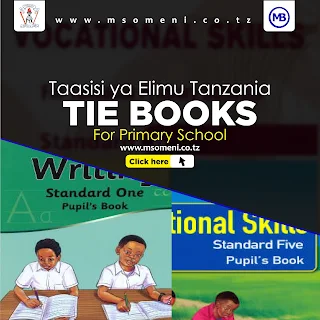This page is about Tie books for primary school or Vitabu vya shule za msingi . It will help you to get Free primary school notes Tanzania.
You will find useful Tie books for primary school kiswahili, English, Hisabati, Sayansi na Teknolojia, maarifa ya jamii n.k
Primary School in Tanzania
As of 2020, Tanzania counted nearly 18.2 thousand public and private primary schools. That same year, there were over 10.9 million students enrolled in primary education in the country.
Recommended: Download sokabet app latest version
The number of primary schools has been increasing since 2016, when Tanzania had approximately 17.2 thousand institutions at this educational level.(https://www.statista.com)
In this article you get simple and fastest way to make TIE books for PRIMARY school pdf.
TIE library does not offer Pdf, but you can make your own pdf.
How to access Free primary school notes Tanzania from Tie books for primary school without data?
Tanzania Institute of Education primary school books Pdf may be a right answer for you especially at time when you don't have data to access internet connection.
Also, you can access Tie books for primary school for English medium schools (Vitabu vya English medium).
Click on the button below to go to Tie books for English medium schools. (Vitabu vya English medium)
Tie books for primary school ENGLISH MEDIUM ( Vitabu vya English medium)
TIE BOOKS For Primary School
On this important article you will find all Free primary school notes Tanzania. These notes are from Tie books for primary school kiswahili, English, Hisabati, Sayansi na Teknolojia, maarifa ya jamii.
The TIE books for primary school or Vitabu vya shule za msingi include:
- Vitabu vya chekechea au Vitabu vya awali
- Vitabu vya darasa la kwanza
- Vitabu vya darasa la Pili
- Vitabu vya darasa la tatu
- Vitabu vya darasa la nne
- Vitabu vya darasa la tano
- Vitabu vya darasa la sita
- Vitabu vya darasa la Saba
How to Open Tie books for primary school
To open tie books for primary school just scroll down to find a book for you then click or tap OPEN to open a book quickly.
Below is a list of all new Tie books for primary school (Vitabu vya shule za Msingi vipya)
Pre-Primary Books (chekechea/Awali)
This table is about all Vitabu vya chekechea au Vitabu vya awali.
| BOOK | OPEN TO READ |
|---|---|
| Michezo na Sanaa | OPEN |
| Kutunza Mazingira | OPEN |
| Kuwasiliana | OPEN |
| Kushirikiana | OPEN |
| Kuhesabu | |
| Kutunza Afya | OPEN |
| English medium books | OPEN |
Standard One Books
Tie books for Darasa la Kwanza.
| BOOK | OPEN TO READ |
|---|---|
| KUSOMA | OPEN |
| Michezo na sanaa | OPEN |
| Kuhesabu | OPEN |
| Afya na mazingira | OPEN |
| Kuandika | OPEN |
| Moduli ya kufundisha kusoma drs1&2 | OPEN |
| Moduli ya Kufundisha Kuhesabu Darasa la I na II | OPEN |
| English medium books | OPEN |
Standard Two Books
| BOOK | OPEN TO READ |
|---|---|
| Kusoma | OPEN |
| Michezo na sanaa | OPEN |
| Kuhesabu | OPEN |
| Kuandika | OPEN |
| Afya na Mazingira | OPEN |
| Moduli ya kufundisha kusoma drs1&2 | OPEN |
| Moduli ya Kufundisha Kuhesabu Darasa la I na II | OPEN |
| English medium books | OPEN |
Standard Three Books
| BOOK | OPEN TO READ |
|---|---|
| Sayansi na Teknolojia | OPEN |
| Uraia na maadili | OPEN |
| English | OPEN |
| Kiswahili | OPEN |
| Maarifa ya Jamii | OPEN |
| Hisabati | OPEN |
| English medium books | OPEN |
Standard Four Books
| BOOK | OPEN TO READ |
|---|---|
| Uraia na maadili | OPEN |
| Sayansi na teknolojia | OPEN |
| Maarifa ya Jamii | OPEN |
| Kiswahili | OPEN |
| English | OPEN |
| Hisabati | OPEN |
| English medium books | OPEN |
Standard Five Books
| BOOK | OPEN TO READ |
|---|---|
| Sayansi na teknolojia | OPEN |
| Uraia na maadili | OPEN |
| Stadi za Kazi | OPEN |
| Hisabati | OPEN |
| Kiswahili | OPEN |
| English | OPEN |
| Maarifa ya Jamii | OPEN |
| English medium books | OPEN |
Standard Six Books
| BOOK | OPEN TO READ |
|---|---|
| Uraia na maadili | OPEN |
| Stadi za Kazi | OPEN |
| Sayansi na teknolojia | OPEN |
| Maarifa ya Jamii | OPEN |
| Hisabati | OPEN |
| Kiswahili | OPEN |
| English | OPEN |
| English medium books | OPEN |
Standard Seven Books
| BOOK | OPEN TO READ |
|---|---|
| Uraia na maadili | OPEN |
| Stadi za Kazi | OPEN |
| Maarifa ya Jamii | OPEN |
| Sayansi na teknolojia | OPEN |
| Kiswahili | OPEN |
| Hisabati | OPEN |
| English | OPEN |
| English medium books | OPEN |
YOU CAN FIND MORE TIE ONLINE BOOKS, AUDIO AND VIDEOS IN THE TIE LIBRARY
In case you need help from us regarding Tie books for primary school, feel better to write in a comment section below.






.jpeg)


